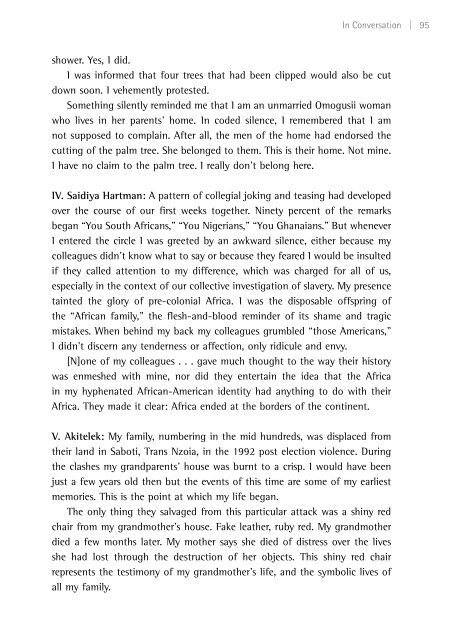You also want an ePaper? Increase the reach of your titles
YUMPU automatically turns print PDFs into web optimized ePapers that Google loves.
In Conversation | 95<br />
shower. Yes, I did.<br />
I was informed that four trees that had been clipped would also be cut<br />
down soon. I vehemently protested.<br />
Something silently reminded me that I am an unmarried Omogusii woman<br />
who lives in her parents’ home. In coded silence, I remembered that I am<br />
not supposed to complain. After all, the men of the home had endorsed the<br />
cutting of the palm tree. She belonged to them. This is their home. Not mine.<br />
I have no claim to the palm tree.I really don’t belong here.<br />
IV. Saidiya Hartman: A pattern of collegial joking <strong>and</strong> teasing had developed<br />
over the course of our first weeks together. Ninety percent of the remarks<br />
began “You South Africans,” “You Nigerians,” “You Ghanaians.” But whenever<br />
I entered the circle I was greeted by an awkward silence, either because my<br />
colleagues didn’t know what to say or because they feared I would be insulted<br />
if they called attention to my difference, which was charged for all of us,<br />
especially in the context of our collective investigation of slavery. My presence<br />
tainted the glory of pre-colonial Africa. I was the disposable offspring of<br />
the “African family,” the flesh-<strong>and</strong>-blood reminder of its shame <strong>and</strong> tragic<br />
mistakes. When behind my back my colleagues grumbled “those Americans,”<br />
I didn’t discern any tenderness or affection, only ridicule <strong>and</strong> envy.<br />
[N]one of my colleagues . . . gave much thought to the way their history<br />
was enmeshed with mine, nor did they entertain the idea that the Africa<br />
in my hyphenated African-American identity had anything to do with their<br />
Africa. They made it clear: Africa ended at the borders of the continent.<br />
V. Akitelek: My family, numbering in the mid hundreds, was displaced from<br />
their l<strong>and</strong> in Saboti, Trans Nzoia, in the 1992 post election violence. During<br />
the clashes my gr<strong>and</strong>parents’ house was burnt to a crisp. I would have been<br />
just a few years old then but the events of this time are some of my earliest<br />
memories. This is the point at which my life began.<br />
The only thing they salvaged from this particular attack was a shiny red<br />
chair from my gr<strong>and</strong>mother’s house. Fake leather, ruby red. My gr<strong>and</strong>mother<br />
died a few months later. My mother says she died of distress over the lives<br />
she had lost through the destruction of her objects. This shiny red chair<br />
represents the testimony of my gr<strong>and</strong>mother’s life, <strong>and</strong> the symbolic lives of<br />
all my family.


